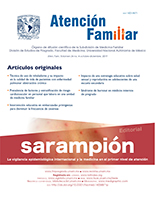Impact of an Educational Strategy on Sexual and Reproductive Health in High School Adolescents
Main Article Content
Abstract
Objective: to assess the impact of a participatory educational strategy on the knowledge of high school adolescents on sexual and reproductive health. Methods: Quasi-experimental study in a group of 37 ninth-grade students from a public high school in Mexico City, during the month of May 2017, an instrument that measured knowledge in sexual and reproductive health was built and validated. After a pre-sampling test, its reliability was calculated with Cronbach’s alpha test and the Mann Whitney’s U-test was used to compare the instrument’s two halves (semi-partition) and verify whether or not there was a difference between them. The educational strategy lasted three days and each activity consisted of three phases: 1) previous activity, 2) work and discussion in subgroups and 3) plenary session. The instrument was applied before and after the participatory educational strategy and the results were compared with the McNemar test. Results: the reliability coefficient of the instrument was 0.7; comparing both halves no statistically significant difference was found between them (p=0.06). 40.5% of participants gained high knowledge before the strategy (n=15) and 72.9% after the strategy (n=27), with a statistically significant difference (p<0.001). Conclusion: the participatory educational strategy proved useful, this can be of great help for adolescents to develop their own knowledge about sexual and reproductive health, and consequently can be applied in their daily lives.
